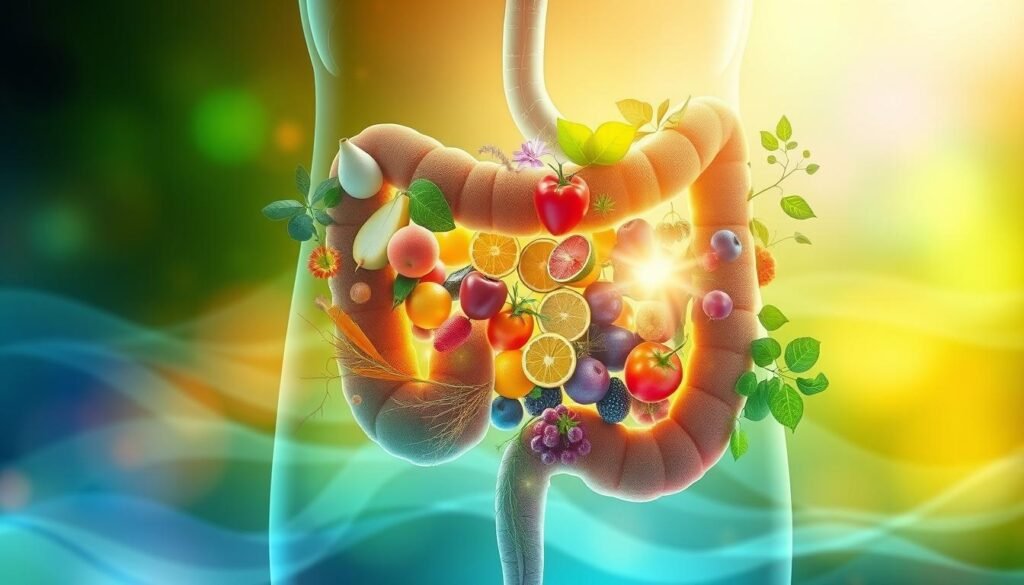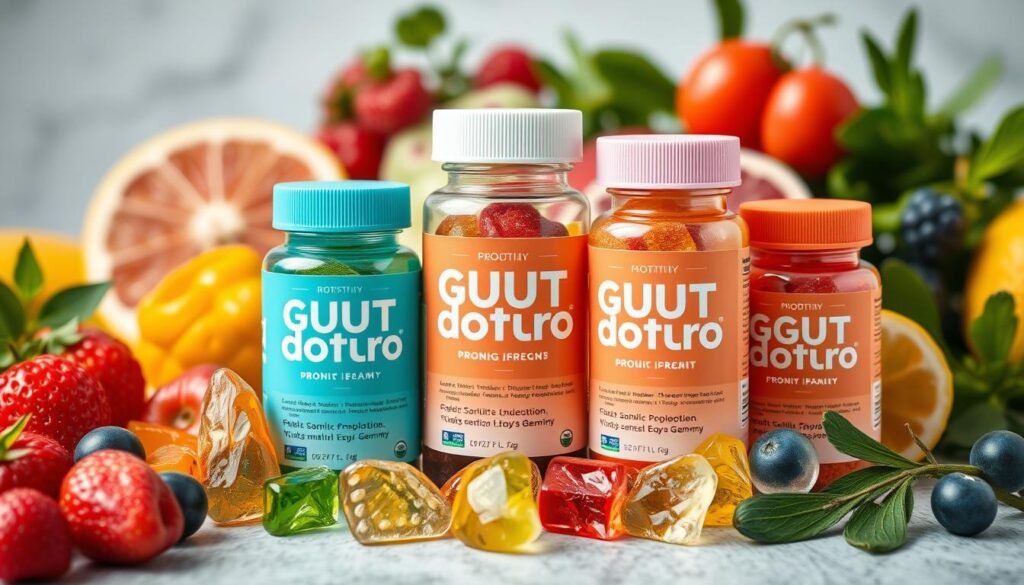Ever thought your gut could make you happier and healthier? The link between gut health and mental wellness is becoming more popular. Research shows our diets greatly affect our mood and emotional state. We’ll explore how a healthy gut can improve our mental health, from less anxiety and depression to better thinking skills.
Studies reveal a healthy gut can lower mood disorder risks, fatigue, and digestive problems. This boosts our overall well-being. Let’s look into how diet shapes our minds and how to improve gut health for clearer thoughts and emotions.
Key Takeaways
- The gut-brain connection significantly influences emotional well-being.
- A balanced gut microbiome is essential for reducing mood disorders and anxiety.
- Diets rich in probiotics and fiber can enhance cognitive function.
- Understanding gut health can lead to effective dietary changes for mental wellness.
- Specific nutrients, like Omega-3 fatty acids, play a vital role in mental health.
The Gut-Brain Connection
The connection between our gut and brain is complex. It affects our mental health deeply. The enteric nervous system in our GI tract has over 500 million neurons, making it very complex. The vagus nerve links our gut and brain, sending important information.
Studies show a strong link between our gut microbiome and mental health issues. This includes neurological and gastrointestinal disorders.
Functional bowel problems affect up to 40% of people at some point. People with IBS often have more depression and anxiety. Probiotics are being studied for their role in improving mood and gut health.
Our gut microbiome affects anxiety, depression, and stress. Animal studies show that changes in gut microbiota can change behavior. This supports the link between gut and mental health.
The gut microbiome is key for brain development and function. It plays a big role in our overall wellness.
Understanding Gut Health and Mental Wellness
Exploring the link between gut health and mental wellness shows us how important it is for our emotional and mental health. A healthy gut microbiome is key to brain function and emotional balance. Up to 80% of our immune cells live in the GI tract, showing the gut’s role in our overall health.
People with GI issues like irritable bowel syndrome and ulcerative colitis often struggle with depression and anxiety. This shows how gut health problems can cause mood disorders.
Also, serotonin, which affects mood and appetite, is mainly made in the gut. So, keeping our gut healthy is vital for our mental health. Eating foods like fruits, vegetables, whole grains, and fermented foods helps grow good gut bacteria.
Probiotics and prebiotics are key to a healthy gut microbiota, leading to better health.
Stress can harm the gut-brain axis, making it important to manage stress and exercise regularly for gut health. Research shows that an imbalance in gut bacteria, or dysbiosis, is linked to anxiety and depression. This shows how gut health and emotional well-being are connected.
Getting enough sleep is also key for gut health and overall well-being. A diverse gut microbiome is vital for digestion, nutrient absorption, and a strong immune system. So, focusing on gut health is a foundational step for better mental wellness.
| Key Factors | Impact on Mental Wellness |
|---|---|
| Gut Microbiome Diversity | Improves mood and reduces anxiety |
| Diet Rich in Probiotics | Supports beneficial gut bacteria |
| Chronic Stress Management | Reduces mood disorders |
| Adequate Sleep (7-9 hours) | Promotes overall health and gut function |
The Importance of a Healthy Gut Microbiome
The gut microbiome is key to our health and happiness. It starts growing from birth, shaped by things like how we’re born and if we’re breastfed. Knowing how these early things affect us is vital for better gut health.
Microbiome Development from Birth
At birth, babies meet their mother’s microbes, starting their own gut community. Babies born by C-section might have less diverse microbes than those born vaginally. This can affect their gut health. Breastfeeding adds to this diversity, helping set a strong health base for life.
Impact of Diet on Microbiome Diversity
What we eat greatly influences our gut’s microbiome. Eating a wide variety of foods helps keep our gut microbiome balanced. Foods high in fiber, like fruits and veggies, help good bacteria grow. This reduces the chance of health problems linked to an unbalanced gut.
Eating a diet full of different nutrients can greatly improve our gut health and overall well-being.
How Diet Influences Mental Health
The link between what we eat and our mental health is strong. The food we choose affects how our brain makes neurotransmitters, which control our mood. Eating the right foods helps keep our brain working well and our mood balanced.
Food and Neurotransmitter Production
Proteins are key because they give us amino acids, which are needed for neurotransmitters like serotonin and dopamine. Eating protein at every meal helps keep our mood stable. Foods like whole grains, fruits, and veggies also give us vitamins and minerals that are good for our brain and body.
Healthy fats from foods like olive oil, nuts, and fish are also important for our brain. But, too much caffeine, like before bed, can make us jittery and anxious.
Dietary Fats and Mood Regulation
Dietary fats play a big role in our mental health. Studies show that diet is linked to a lot of health problems in adults. Dr. Simon Evans says omega-3 fatty acids in nuts and fish are key for our mental health.
Not getting enough fat can hurt our brain, as it’s mostly fat. It’s also important to watch out for too much sugar, even in healthy-looking foods, and to read labels.
| Nutrient Type | Roles in Mental Health | Food Sources |
|---|---|---|
| Proteins | Regulate mood through neurotransmitter production | Meat, legumes, nuts, dairy |
| Healthy Fats | Support overall brain health and function | Olive oil, avocados, fatty fish |
| Whole Grains | Provide energy and essential vitamins | Brown rice, quinoa, oats |
| Fruits & Vegetables | Boost mood and gut health | Leafy greens, berries, bananas |
Dietary Patterns Beneficial for Mental Health
Exploring different diets shows their big impact on mental health. Each diet can help improve gut health, which is key for feeling good emotionally. Knowing how certain foods can help mental health gives us useful tips for better mental wellness.
Mediterranean Diet and Its Benefits
The Mediterranean diet is known for being good for the heart. It’s full of omega-3s, fruits, and veggies. Studies show it can lower the risk of feeling depressed by 10%.
Legumes and whole grains in this diet are great for mental health. It also has healthy fats from olive oil, nuts, and fish. These fats help our brains work well.
Vegetarian and Ketogenic Diets
Vegetarian diets can make us feel happier and reduce depression. A study with 181,990 UK Biobank participants found this. It showed that a vegetarian diet can make brain areas bigger.
The ketogenic diet, with its low carbs and high fats, also looks promising for brain health. It matches the idea that balanced nutrients are key for mental health.
The Role of Omega-3 Fatty Acids
Omega-3 fatty acids are key for both mental wellness and gut health. Adding them to my diet boosts emotional well-being. Studies show that EPA and DHA, found in fish, are vital for brain health and overall health. Knowing where to find omega-3 is important for better mental health.
Sources of Omega-3 and Their Mental Health Benefits
Many foods are rich in omega-3 fatty acids. Some top sources include:
- Fatty fish (e.g., salmon, mackerel, sardines)
- Walnuts
- Flaxseeds
- Chia seeds
- Hemp seeds
Eating these foods can help mental health. For example, research shows that eating more of these foods can improve brain function and lower depression. Also, studies suggest that enough DHA and EPA can help with memory and learning in older adults.
Omega-3 Deficiency and Depression Risk
Not getting enough omega-3 fatty acids can increase depression risk. Studies link low DHA in older adults to smaller brains and faster brain aging. People who don’t eat enough omega-3s often feel more anxious and depressed. This highlights the importance of getting enough omega-3 for gut health and mental wellness.
| Food Source | Omega-3 Content (per 100g) | Mental Health Benefits |
|---|---|---|
| Salmon | 2,260 mg | Improves mood, reduces depression risk |
| Walnuts | 7,250 mg | Supports cognitive function, enhances memory |
| Flaxseeds | 22,813 mg | Encourages mental clarity, reduces anxiety |
| Chia seeds | 17,880 mg | Provides mood stabilization, lessens stress |
By adding these omega-3 sources to my meals, I focus on better gut health and mental wellness.
Understanding the Concept of Nutritional Psychiatry
Nutritional psychiatry is a new field that shows how diet affects our mental health. It suggests changing what we eat could help treat mental issues. Eating foods rich in nutrients is key for a healthy brain and good mood.
Not getting enough vitamins like B12, B6, and folic acid can lead to depression and memory loss.
- Eating foods high in omega-3s, like salmon, is good for our brains.
- Antioxidants in fruits and veggies help protect our cells from damage linked to depression.
- Foods rich in magnesium, like nuts and greens, can lower anxiety and help us sleep better.
Nutritional psychiatry focuses on tailored diets for mental health issues and nutrient gaps. Working with doctors is important to create diet plans that fit each person’s needs. Eating more fish can help fight depression, showing the power of food choices.
This supports a complete approach that includes nutrition in mental health care. It shows that changing our diet could lead to better mental health.
How Processed Foods Affect Gut Health
Studies show that eating processed foods harms gut health and can lead to mental health problems. About 60 percent of the calories in an average American’s diet come from processed foods. Also, 70 percent of packaged foods in the U.S. are very processed.
Research finds that eating more of these foods can make people feel sad and anxious. Eating them too much can make you addicted to food. This addiction can mess with your gut health.
Understanding Food Addiction and Cravings
Food addiction is when you can’t stop eating certain foods. These foods play tricks on your brain, making you want more. This can mess up your gut and affect your mood.
These foods can also cause inflammation. This inflammation can mess with your brain’s happy chemicals, making you feel worse.
Inflammation and Mood Disorders
Inflammation is linked to mood disorders, showing how bad processed foods are for your mind. Foods high in sugar can make you feel moody and tired. This is because they mess with your blood sugar.
The bacteria in your gut can also affect your mood.
Eating too much of these foods can make you more likely to get depressed. But, eating foods like whole grains and fatty fish can help your mental health.
Practical Digestive Health Tips
Keeping your gut healthy is key to feeling good overall. Adding certain tips to your daily life helps keep your gut balanced. Focus on probiotics, prebiotics, and drinking plenty of water.
Incorporating Probiotics and Prebiotics
Probiotics add good bacteria to your gut, helping with digestion and absorbing nutrients. Foods like yogurt, kefir, sauerkraut, and kimchi are full of probiotics. They help your gut and can even boost your mood and mental health. Prebiotics feed these good bacteria. You can find them in garlic, onions, asparagus, bananas, and whole grains. Adding these foods to your diet is a great way to improve your gut health.
Hydration and Its Impact on Gut Health
Drinking enough water is also very important for your gut. Not drinking enough can cause dehydration and constipation. Water helps soften your stool and keeps your bowel movements regular. This simple habit can make you feel better and help you absorb nutrients better.

In summary, eating foods rich in prebiotics and probiotics, and staying hydrated, is vital for better gut health. By following these tips, you can improve your overall well-being and emotional balance.
Mindful Eating for Emotional Well-Being
Mindful eating is a powerful way to improve emotional health. It means paying full attention to what we eat, noticing taste, satisfaction, and when we’re full. In today’s world, many of us eat without thinking, leading to unhealthy habits and emotional eating.
By practicing mindful eating, we can digest food better, make smarter food choices, and boost our overall health. It’s not just about eating; it also reduces stress and changes how we view food. We can enjoy meals more and choose healthier options.
Mindful eating helps us feel full faster, so we can eat smaller portions and feel just as satisfied. It’s about being fully present from buying to eating food, without distractions.
To start eating mindfully, we can check our hunger, savor flavors, chew slowly, and learn about our food’s origins. Even if we can’t eat mindfully all the time, trying to do so more often can greatly benefit us. It helps us understand how food affects our emotions and health.
Knowing that mindful eating can improve mood and reduce stress is key. To make it a part of our lives, we can create a calm meal space, eat with purpose, listen to our body’s hunger cues, be thankful for our food, and even write about our experiences.
| Mindful Eating Benefits | Emotional Well-Being Impact |
|---|---|
| Stress Reduction | Lowered cortisol levels enhance well-being |
| Improved Digestion | Greater awareness of hunger signals |
| Healthier Food Choices | Transforming the relationship with food |
| Heightened Satisfaction | Feeling fuller with smaller portions |
| Mindful Practices | Emotional eating addressed thoughtfully |
Gut Health Supplements to Consider
I’ve looked into how gut health supplements can boost mental wellness. Adding certain supplements can greatly improve gut health. This benefits both our physical and mental health. It’s important to know the different types of gut health supplements to make good choices.
Types of Supplements and Their Benefits
Probiotics and prebiotic fibers are key for gut health. Probiotics are live bacteria that help balance gut microbiota. Prebiotics feed these good bacteria, helping them thrive in the gut.
Eating prebiotics from fruits and veggies helps create a healthy gut environment. This supports overall gut health.
- Probiotics: They increase gut flora diversity. This can reduce bloating and improve mood through the gut-brain connection.
- Prebiotics: These fibers help healthy bacteria grow. They aid digestion and boost gut health.
- Ginger: Research shows ginger can improve gut microbiota. It leads to better microbial diversity than a placebo.
- Glutamine: It can help with IBS symptoms like abdominal pain and bloating.
- Vitamin D: It has anti-inflammatory effects in the digestive tract. It helps keep the gut wall healthy.
- Butyrate: A fatty acid that nourishes the colon lining. But research on its benefits is mixed.
- Curcumin: Found in turmeric, it may support good gut bacteria. More human studies are needed to confirm its effects.
Consulting Health Professionals Before Use
Always talk to a healthcare professional before starting gut health supplements. They can guide you on the right dosage and any possible drug interactions. Tailoring your supplement plan to your needs can greatly improve your gut health.
Long-Term Benefits of Improving Gut Health
Improving gut health brings many long-term benefits. It greatly affects both emotional strength and brain function. Recent studies show a strong link between gut health and mental well-being. A balanced gut microbiome can greatly improve life quality.
Reducing Anxiety and Depression Symptoms
A healthy gut can help reduce anxiety and depression symptoms. People with gut problems often feel more anxious and depressed. This highlights the importance of eating foods rich in probiotics and prebiotics.
Probiotics, found in yogurt and sauerkraut, can help restore gut balance. This can reduce symptoms of anxiety and depression. Taking care of your gut health can also boost your mood and emotional well-being over time.
Enhancing Overall Cognitive Function
Good gut health is linked to better brain function. A diverse gut microbiome, with about 200 bacterial species, helps with mental clarity and memory. Eating foods high in fiber can help keep the gut diverse.
This can lower the risk of cognitive decline and diseases like Alzheimer’s. Taking care of your gut is key for long-term brain health and fighting mental fatigue.
Emotional Well-Being through Diet
Diet plays a big role in our mental health. Eating foods like fruits, veggies, and omega-3s can make us feel better. These foods help our mood and might lower depression risk.
Gut bacteria, which make most of our serotonin, are key to our mood. Eating foods that help our gut health is important for feeling good.
Eating anti-inflammatory foods like turmeric and leafy greens can improve our mental health. Foods like brown rice give us energy, helping us stay focused. Lean proteins help make neurotransmitters, which help us feel better.
Stable blood sugar is important for feeling good. Avoiding foods that cause blood sugar spikes is key. This helps us stay mentally and physically stable.
To improve emotional well-being, we need to eat nutrient-rich foods and support our gut health. Making these changes can greatly improve our mental state. It shows how our diet affects our mood.
Scientific Studies Linking Diet, Gut Health, and Mental Wellness
Many studies have looked into how diet, gut health, and mental wellness are connected. They show how what we eat can change our gut bacteria and our mood.
Research Findings on Dietary Interventions
A big discovery was made in a study of 32 trials. It found that better diets can help reduce anxiety and depression. Another study of 34 human trials found similar bacteria in people with depression and other mental health issues.
Conclusions from Recent Studies
Recent research shows that certain diets can greatly improve gut health and mental wellness. For example, a study found that gut bacteria from depressed people can make rats feel sad. Also, 90% of our serotonin, which helps us feel good, is made in the gut.
Conclusion
It’s important to understand how gut health affects our mental well-being. Studies show that our gut plays a big role in our mood and anxiety. This means what we eat can greatly impact how we feel.
Our gut health and mental wellness are closely linked. Making changes to our diet can help improve our emotional state over time. This shows how vital gut health is for our overall well-being.
Making small changes to our diet can lead to big health benefits. Eating foods rich in probiotics and prebiotics helps our gut stay healthy. This, in turn, helps us fight mood disorders and stay sharp mentally, .
Improving our mental health through gut health requires dedication and attention. By understanding the connection between our diet and emotions, we can live a healthier, happier life. Our choices in food can shape our future well-being.


